
JOURNAL OF INSECT SCIENCE
Scope & Guideline
Connecting Research with Real-World Impact
Introduction
Aims and Scopes
- Molecular and Genetic Studies:
Research involving molecular techniques to understand the genetic basis of insect traits, behaviors, and interactions, including studies on gene expression, genetic diversity, and phylogenomics. - Insect Ecology and Behavior:
Investigations into the ecological roles of insects and their behavioral adaptations to environmental changes, including studies on predator-prey interactions, mating behaviors, and foraging strategies. - Insect Physiology and Development:
Studies focusing on the physiological processes in insects, developmental stages, and the effects of environmental factors on growth and reproduction. - Insect Pest Management and Control:
Research dedicated to the development of sustainable pest management strategies, including biological control methods, insecticide resistance, and integrated pest management practices. - Insect Conservation and Biodiversity:
Studies aimed at understanding insect diversity, population dynamics, and conservation strategies, particularly in relation to habitat changes and climate impacts.
Trending and Emerging
- CRISPR and Genetic Engineering:
The use of CRISPR/Cas9 technology and other genetic engineering methods is becoming increasingly prevalent, highlighting a trend towards manipulating insect genomes for research and pest control. - Impacts of Climate Change on Insect Populations:
Research focusing on how climate change affects insect distribution, behavior, and physiology is gaining traction, indicating a growing concern for biodiversity and ecosystem stability. - Microbial Interactions and Gut Microbiome Studies:
Emerging themes in the exploration of gut microbiomes in insects are becoming prominent, revealing the complex interactions between insects and their associated microbial communities. - Insect Responses to Pesticides and Environmental Stressors:
There is a notable increase in studies examining the effects of pesticides and other environmental stressors on insect health, behavior, and population dynamics, reflecting heightened awareness of ecological impacts. - Insect-Based Food and Feed Research:
The exploration of insects as sustainable food sources for humans and livestock is trending, driven by the need for alternative protein sources and waste reduction in food systems.
Declining or Waning
- Traditional Taxonomy:
There has been a noticeable decline in papers solely focused on traditional taxonomic studies as molecular techniques and genetic approaches increasingly dominate research, offering more precise classifications. - Chemical Ecology of Insect Interactions:
Fewer studies are focusing on the chemical ecology of insect interactions, such as pheromone signaling and plant-insect chemical interactions, possibly due to a shift towards more integrative and broader ecological studies. - Morphological Studies:
Research centered exclusively on morphological traits of insects is decreasing, as there is a growing emphasis on molecular and genomic approaches that provide deeper insights into evolutionary relationships.
Similar Journals
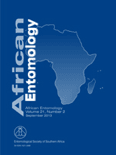
AFRICAN ENTOMOLOGY
Exploring the Intricacies of Insect Science in AfricaAFRICAN ENTOMOLOGY, published by the Entomological Society of Southern Africa, is a pivotal journal dedicated to the vibrant field of entomology and its related disciplines. With an ISSN of 1021-3589 and an E-ISSN of 2254-8854, it serves as an essential resource for researchers, professionals, and students interested in the intricacies of insect science across diverse ecological and agricultural landscapes. This journal, with a convergence of publications from 1994 to 2024, holds notable rankings, notably placing in Q2 for Agronomy and Crop Science and Q3 for both Ecology, Evolution, Behavior and Systematics and Insect Science as of 2023. The journal has made significant contributions to the knowledge and understanding of insect populations, their behaviors, and interactions within ecosystems, making it highly relevant for those engaged in agricultural practices and biodiversity conservation. AFRICAN ENTOMOLOGY welcomes original research articles, reviews, and special issues that broaden the dialogue surrounding entomological studies, and while it operates under conventional access policies, it remains an influential platform for scholarly discourse in Southern Africa and beyond.
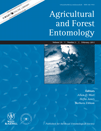
AGRICULTURAL AND FOREST ENTOMOLOGY
Innovating pest management for a greener future.AGRICULTURAL AND FOREST ENTOMOLOGY is a leading journal published by Wiley, focusing on the interface of entomology, agriculture, and forestry. With a robust impact reflected in its Q2 and Q1 quartile rankings in prominent categories like Agronomy and Crop Science, Forestry, and Insect Science, this journal serves as a vital platform for researchers and professionals seeking to advance their understanding of insect impacts on agricultural and forest ecosystems. Since its inception in 1999, it has provided a comprehensive collection of high-quality research, facilitating interdisciplinary discussions and innovations in pest management, biodiversity, and sustainable practices. Although it does not currently offer Open Access, the journal continues to uphold rigorous peer-review standards, ensuring that published works maintain a profound scientific value. As of 2023, its Scopus rankings further signify its prominence in the field, engaging a global audience keen on addressing the pressing challenges faced within agricultural and forest sciences.

Frontiers in Insect Science
Exploring the Wonders of Insect BiologyFrontiers in Insect Science is a pioneering open-access journal dedicated to the advancement of knowledge in the field of insect science. Published by FRONTIERS MEDIA SA in Switzerland, this journal serves as a vital platform for researchers, professionals, and students to disseminate high-quality, peer-reviewed research spanning diverse topics within insect biology, ecology, and pest management. Since its establishment in 2021, the journal has gained recognition, ranking in the Q2 category of Insect Science with a Scopus ranking of #92 out of 181 in the field. With a commitment to promoting open access and collaboration, Frontiers in Insect Science is instrumental in fostering innovative research and practical applications essential for combating biodiversity loss and enhancing agricultural sustainability. As a freely accessible resource, it invites contributions that impact both fundamental and applied insect research, connecting a global network of scholars eager to explore the fascinating world of insects.
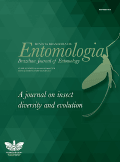
REVISTA BRASILEIRA DE ENTOMOLOGIA
Innovating research for a deeper understanding of insects.REVISTA BRASILEIRA DE ENTOMOLOGIA, published by the SOCIEDADE BRASILEIRA DE ENTOMOLOGIA, is a premier open-access journal dedicated to the field of insect science, particularly within the context of Brazil's rich biodiversity. Since its inception in 2002, this journal has aimed to provide a platform for the dissemination of high-quality research, covering various aspects of entomology including behavior, ecology, and the impact of insects on agriculture. With an ISSN of 0085-5626 and an E-ISSN of 1806-9665, it is indexed in Scopus, ranking in the 39th percentile among its peers in the insect science category. Operating out of Curitiba, Brazil, and with emerging recognition beyond national borders, the journal reflects an ongoing commitment to advancing the science of entomology through rigorous peer-reviewed articles. By making its content freely accessible, REVISTA BRASILEIRA DE ENTOMOLOGIA encourages widespread engagement and collaboration among researchers, professionals, and students alike.

Insects
Fostering Collaboration in Entomological DiscoveriesInsects is a prominent open-access journal published by MDPI, dedicated to advancing research in the vibrant field of insect science. Since its inception in 2011, this journal has become a vital resource for academics and professionals alike, also ranked in the prestigious Q1 category within the Insect Science field by Scopus, achieving a remarkable rank of 26 out of 181 journals. With an ongoing convergence period from 2010 to 2024, Insects provides comprehensive coverage of various aspects of entomology, including but not limited to ecology, behavior, physiology, and applied entomology. Based in Switzerland, the journal promotes an open-access model, ensuring that vital research is readily available to researchers, practitioners, and students globally. This journal not only facilitates the dissemination of groundbreaking entomological research but also fosters collaboration and interdisciplinary dialogue in the field.

Current Research in Insect Science
Unveiling the Secrets of Insect Behavior and EvolutionCurrent Research in Insect Science is a premier journal published by Elsevier, dedicated to advancing knowledge in the field of insect science and its multifaceted applications across ecology, evolution, and behavior. Established in 2021, this journal aims to provide a platform for researchers to disseminate innovative findings that address the ecological significance of insects, their evolutionary processes, and their behavior in diverse environments. With an impressive Q2 ranking in Animal Science and Zoology, Ecology, Evolution, Behavior and Systematics, and Insect Science categories, the journal enjoys a reputable status within the academic community. Its Scopus ranks reflect its impactful contributions to the field, placing it within the top 30% of publications in relevant disciplines. While the journal operates on an open access model, ensuring wide accessibility to research, it remains committed to maintaining rigorous peer-review standards. Researchers, professionals, and students alike will find Current Research in Insect Science an invaluable resource for staying informed on the latest advancements and discussions in insect biology.

TURKIYE ENTOMOLOJI DERGISI-TURKISH JOURNAL OF ENTOMOLOGY
Championing Excellence in Insect ResearchTURKIYE ENTOMOLOJI DERGISI - TURKISH JOURNAL OF ENTOMOLOGY is a distinguished journal published by the Entomological Society of Turkey in collaboration with Ege University, dedicated to advancing the field of insect sciences. With an ISSN of 1010-6960 and E-ISSN 2536-491X, this journal plays a pivotal role in disseminating groundbreaking research in entomology, particularly focusing on the diverse aspects of insect biology, ecology, and their applications in agriculture. As a member of the Q3 category in Insect Science according to the 2023 quartiles, it ranks in the 40th percentile of its field, indicating its growing influence and importance within the scientific community. The journal's scope encompasses innovative research findings, reviews, and short communications that contribute to the understanding and management of insect species. While not currently open access, it serves as a vital resource for researchers, professionals, and students seeking to stay informed about the latest developments in entomology from Turkey and beyond, with a commitment to maintaining high scholarly standards through rigorous peer review processes.
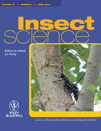
Insect Science
Connecting disciplines through the lens of insect science.Insect Science, published by WILEY, stands as a prestigious journal in the realms of Agronomy, Biochemistry, Genetics, and Insect Ecology. The journal, with ISSN 1672-9609 and E-ISSN 1744-7917, has firmly established itself as a significant resource for researchers and professionals seeking to explore the intricate dynamics of insects and their crucial roles in ecosystems. With a remarkable impact factor placing it in the Q1 quartile across multiple categories, including Ecology and Evolution and Agronomy and Crop Science, Insect Science ranks impressively at #8 out of 181 in the realm of Insect Science on Scopus, showcasing its influence and relevance in the field. Spanning its coverage from 1994 to 2024, this journal invites contributions that advance our understanding of insect biology, behavior, and their interactions within agricultural contexts. The commitment to high-quality research and its role in fostering interdisciplinary dialogue make Insect Science an essential platform for scholars and practitioners at the forefront of insect-related studies.
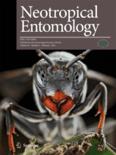
NEOTROPICAL ENTOMOLOGY
Pioneering Research in Neotropical Insect ScienceNEOTROPICAL ENTOMOLOGY, published by the Entomological Society of Brazil, is a leading journal in the field of Insect Science, recognized for its significant contributions to the understanding of entomological research within the Neotropical region. With an impact factor placing it in the Q2 category and ranked #52 out of 181 in the Scopus rankings for Agricultural and Biological Sciences, this journal provides a vital platform for both seasoned researchers and emerging scholars to publish their innovative findings. Covering a broad scope of topics related to entomology, NEOTROPICAL ENTOMOLOGY aims to highlight the unique biodiversity and ecological significance of insects, fostering further appreciation and study within this crucial area of life sciences. The journal is available in both print (ISSN: 1519-566X) and online (E-ISSN: 1678-8052), ensuring accessibility to a wide audience and enhancing the dissemination of knowledge. As it converges towards its 2024 volume, the journal remains committed to advancing the scientific understanding of insect life in the tropics, making it an essential resource for researchers, professionals, and students alike.
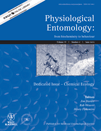
PHYSIOLOGICAL ENTOMOLOGY
Illuminating the Intricacies of Insect PhysiologyPHYSIOLOGICAL ENTOMOLOGY is a prestigious journal published by WILEY, focusing on the intricate relationships between physiological processes and the ecological and evolutionary dynamics of insects. With an ISSN of 0307-6962 and E-ISSN of 1365-3032, this journal has been at the forefront of insect science since its inception in 1976, contributing significantly to the understanding of insect physiology and behavior. The journal has established itself within the academic community, currently holding a position in the Q2 quartile for both Ecology, Evolution, Behavior and Systematics and Insect Science, highlighting its relevance and impact in these fields. Although there are no Open Access options available, researchers and practitioners can rely on its regular publications to stay abreast of pivotal discoveries and methodologies in insect physiology. With a commitment to advancing the field through rigorous peer-reviewed research, PHYSIOLOGICAL ENTOMOLOGY serves as an essential resource for researchers, professionals, and students alike.